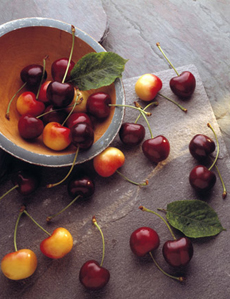TIP OF THE DAY: Storing Fresh Fruit, Part 1
|
Don’t toss fresh fruit in the fridge: Most fruits are best kept in a cool, dry place, such as on a countertop, away from sunlight and heat. As with tomatoes, refrigeration can actually alter the flavor. That’s why you should only buy what you can reasonably expect to consume before it becomes overripe. Today’s tip comprises fruit ripening tips from The FruitGuys founder Chris Middlesteadt. The FruitGuys delivers farm-fresh fruit and vegetables to businesses, homes and schools nationwide. The company pioneered the “fruit at work” concept in San Francisco in 1998 to help companies provide healthy snacking options to employees. APPLES Apples should be kept in a cool space (below 60°F-70°F), away from sunlight and heat, where they will keep well for two weeks or so. Refrigerated apples can last as long as six weeks and still maintain their qualities. |
Apricots ripening on the counter. Stone fruits in general, taste better if they aren’t refrigerated. Photo courtesy FrogHollow.com. |
|
|
APRICOTS & ANGELCOTS Angelcots are a white-fleshed variety of apricot. Apricots and all stone fruits continue to ripen after picking and should be stored at room temperature, away from sunlight and heat, until they give softly to the touch and have a sweet aroma. Once ripe, you can refrigerate the fruit as necessary to prevent spoiling; but cold temperatures may change their texture and taste. AVOCADOS Store avocados at room temperature until they are ripe. They’ll give slightly to pressure when they’re ready to eat. Speed up the ripening process by putting them in a paper bag for a couple of days. After ripening, they can be refrigerated for several days. Avocado halves should be stored in an airtight container in the fridge with the pit still in place. |
||
 Queen Anne and Bing cherries. Photo courtesy Washington State Fruit Commission. |
BANANAS
Store bananas at room temperature away from direct sunlight and heat. Bananas become yellow, soft and sweet as they ripen. To speed the ripening process, put bananas in a paper bag overnight along with an apple. The natural ethylene gas released by the apple will help ripen the bananas. Bananas are very delicate and can be easily damaged by extreme temperatures, hot or cold. If bananas turn black then most likely the fruit was exposed to extreme cold temperatures. Refrigerating bananas turns the skin black, but not the flesh. If you have too many ripe bananas, stick them in the fridge, slice and freeze, or make some banana bread or Banana Daiquiris! BERRIES Berries are picked ripe; these fragile fruits should be enjoyed as soon as possible. For overnight storage, they should be refrigerated. But don’t wash them until you’re ready to eat (or freeze) them. |
|
|
CHERRIES
If your cherries last uneaten for more than a day, store them unwashed in a plastic bag in the fridge for up to a week or so. When ready to use, rinse and let warm to room temperature for best flavor. They’re also great pitted and frozen for a refreshing cold treat, or tossed into smoothies. Grapefruit, lemons, limes, oranges, pomelos and tangerines can be stored at room temperature for a week or so, out of direct sunlight; or refrigerated for several weeks. Figs are picked ripe and should be stored in the refrigerator until ready to eat. You can enjoy them cold or at room temperature. Figs and fresh goat cheese are one of our favorite treats. Tune in tomorrow for Ripening Tips Part 2, from grapes and melons to peaches and plums.
|
||


